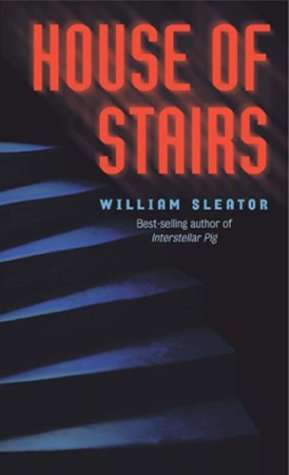House of Stairs

America in the distant future is a Crapsack World with little room to live, hardly any food to eat and even less to go around for the disadvantaged. Five sixteen-year-old orphans are abducted and relocated to a house filled with nothing but sets of endless staircases, a landing with running water and a flashing machine that forces them to play mind games for food. None of them know the reasons behind being put in the House of Stairs, and the machine forces them to perform acts of escalating cruelty upon one another. Their escape hinges upon being able to divine what they can about their circumstances and the motives of their captors.
House of Stairs was written by William Sleator in 1974. One of his earliest works and considered to be one of his best books to date.
- Conveniently an Orphan: All five of the main characters are orphans. Justified in that the government specifically took teenagers from orphanages so they wouldn't run into as many legal/missing persons issues.
- Crapsack World: The food that comes out of the machine is actually cooked meat, but most of the teenagers describe it as "brown pellets" because none of them, save Blossom, who had come from a wealthy background before being orphaned, had ever even seen or heard of eating meat before.
- Dystopia
- Designated Love Interest: Averted and even lampshaded by the author. The last two protagonists get out of the building, and they're walking together and holding hands. One of them then spends a paragraph lecturing the reader on how not all inter-gender relationships are sexual. Anvilicious, perhaps, but probably necessary given how common this trope is.
- It Got Worse: What's that? You were abducted and put into a White Void Room with a bunch of other teenagers and forced to dance for a machine in order to get food? Well you're lucky that all you have to do is dance...
- Ontological Mystery: None of the characters know how or why they were taken to the house of stairs, or what the whole purpose of them being there might even be.
- Shown Their Work: Sleator clearly did at least basic research on psychological conditioning.
- Super Soldier: The ultimate purpose of the mental conditioning the House provides.
- White Void Room: The setting of the House itself is mainly a big white void filled with stairs that lead nowhere.
- You All Meet in a Cell: These are the circumstances of the book in a nutshell.
- Zeerust: The depiction of the food machine as a giant metal box with flashing lights and beeping sounds is quite retro by today's standards.